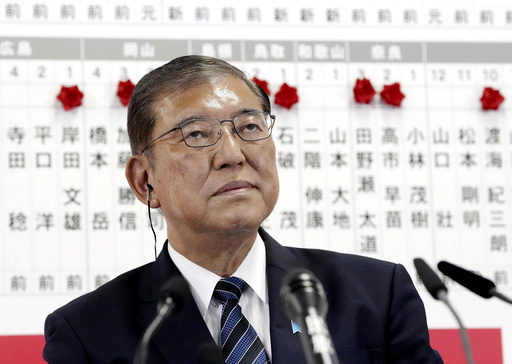
TOKYO — In the recent parliamentary elections held on Sunday, the ruling party of Japanese Prime Minister Shigeru Ishiba, along with its smaller coalition partner, lost their majority in a surprising electoral blow. This significant defeat arrives just a month into Ishiba’s leadership, posing immediate challenges for his governance.
The election results appear to reflect widespread voter discontent regarding a series of financial scandals that have plagued the Liberal Democratic Party (LDP). This party has maintained an almost uninterrupted grasp on Japan’s political power since 1955. The ramifications of this loss are expected to create instability in the political landscape, hindering Ishiba’s abilities to initiate the reforms necessary to regain public support.
In this latest electoral round, the LDP was stripped of its majority in the more influential lower house of Japan’s bicameral parliament. Even with the inclusion of the Komeito party—a long-time ally—the results fell short of Ishiba’s aspirations to retain a dominant presence in the 465-seat chamber. Many seasoned lawmakers from the LDP, including a prominent agricultural minister and other key figures, lost their seats amidst this upheaval.
The election proved disastrous for Komeito as well, as its new leader, Keiichi Ishii, also lost his position. On the contrary, the main opposition party, the Constitutional Democratic Party of Japan, made considerable gains, winning an additional 50 seats. However, they lack the numbers to assume power on their own and would need to forge alliances with other opposition factions, ranging from communists to conservatives, to create a viable coalition.
As it stands, Ishiba’s recent electoral setback does not directly lead to a change in leadership. At a press conference held on Monday, he affirmed his commitment to remain in office and intensify efforts aimed at political reform and economic improvement to restore the public’s trust. Ishiba stated, “Given the serious security and economic circumstances we face, it is critical that we do not allow political processes to become stagnant. I intend to diligently advance our policies to meet the people’s expectations.”
Despite his determination, forming a coalition with potential allies may prove challenging. The differences in agendas with the parties Ishiba might consider for partnership are significant, making it hard to rally enough support before the next parliamentary session, which must convene within a month to appoint a prime minister and new Cabinet members. His inability to secure a majority complicates his path toward getting initiatives passed in parliament.
The main factor contributing to this political misstep boils down to voter backlash against ongoing financial scandals during a period characterized by increasing living costs and stagnant wages. Fumio Kishida, Ishiba’s predecessor, stepped down after his attempts to combat corruption fell flat, and Ishiba essentially adopted similar approaches. Although he made moves to distance himself from candidates marred by scandal, reports suggesting that the LDP had previously funneled substantial amounts to those candidates tarnished his efforts. Voters expressed frustration over Ishiba’s perceived indifference to public anger surrounding these corruption issues, which reinforced the notion that he was merely following in the footsteps of earlier leaders.
In his pursuit of solutions, Ishiba has promised to reinvigorate Japan’s rural economies, address declining birth rates, and enhance national defense; however, he has faced criticism for surrounding himself with familiar faces and maintaining a predominantly male Cabinet. Compromising with the party’s strong right-wing faction, he reversed his earlier positions on dual surnames for couples and the legalization of same-sex marriage, both of which have garnered considerable public backing.
Looking forward, Ishiba indicated on Monday that he intends to stay aligned with the Komeito party and won’t seek immediate partnerships with the opposition. However, he is open to discussions with parties that gained influence during the election. To bolster his position, he might pursue collaborations with the Democratic Party of the People, which advocates for lower taxes, or with the Japan Innovation Party, although the latter has shown little willingness to cooperate.
Yoshihiko Noda, the leader of the Constitutional Democratic Party, who served as prime minister during a previous LDP downturn between 2009 and 2012, might also explore alliances with the DPP and the Innovation Party, though unifying on contentious topics, like nuclear energy, will be difficult. Noda has signaled interest in challenging Ishiba for his position in the parliament, recognizing the parliamentary appointment of the prime minister as a formality after the recent elections, highlighting his desire for a governmental transition.
The outcomes of this election and the ensuing political turbulence are likely to have implications on Japan’s diplomatic, security, and economic strategies. Ishiba must concentrate on reforming political structures and stimulating economic growth to tackle voter dissatisfaction, including initiatives to assist low-income households. However, the focus on domestic challenges could divert attention from crucial defense enhancements, plans for increased military funding, and maintaining robust diplomatic relationships with the United States, particularly given the presence of American troops stationed in Japan. Concerns abound that Ishiba’s weakened authority might undermine Japan’s international standing, especially as discussions surrounding burden-sharing with the US grow more prominent.
